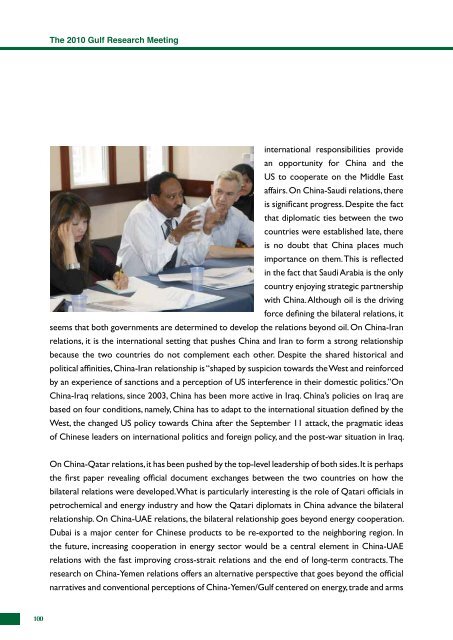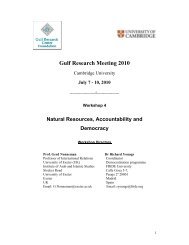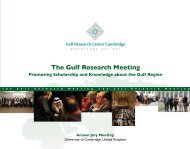GRM 2010 Report - Centre of Islamic Studies - University of ...
GRM 2010 Report - Centre of Islamic Studies - University of ...
GRM 2010 Report - Centre of Islamic Studies - University of ...
You also want an ePaper? Increase the reach of your titles
YUMPU automatically turns print PDFs into web optimized ePapers that Google loves.
100<br />
The <strong>2010</strong> Gulf Research Meeting<br />
international responsibilities provide<br />
an opportunity for China and the<br />
US to cooperate on the Middle East<br />
affairs. On China-Saudi relations, there<br />
is significant progress. Despite the fact<br />
that diplomatic ties between the two<br />
countries were established late, there<br />
is no doubt that China places much<br />
importance on them. This is reflected<br />
in the fact that Saudi Arabia is the only<br />
country enjoying strategic partnership<br />
with China. Although oil is the driving<br />
force defining the bilateral relations, it<br />
seems that both governments are determined to develop the relations beyond oil. On China-Iran<br />
relations, it is the international setting that pushes China and Iran to form a strong relationship<br />
because the two countries do not complement each other. Despite the shared historical and<br />
political affinities, China-Iran relationship is “shaped by suspicion towards the West and reinforced<br />
by an experience <strong>of</strong> sanctions and a perception <strong>of</strong> US interference in their domestic politics.”On<br />
China-Iraq relations, since 2003, China has been more active in Iraq. China’s policies on Iraq are<br />
based on four conditions, namely, China has to adapt to the international situation defined by the<br />
West, the changed US policy towards China after the September 11 attack, the pragmatic ideas<br />
<strong>of</strong> Chinese leaders on international politics and foreign policy, and the post-war situation in Iraq.<br />
On China-Qatar relations, it has been pushed by the top-level leadership <strong>of</strong> both sides. It is perhaps<br />
the first paper revealing <strong>of</strong>ficial document exchanges between the two countries on how the<br />
bilateral relations were developed. What is particularly interesting is the role <strong>of</strong> Qatari <strong>of</strong>ficials in<br />
petrochemical and energy industry and how the Qatari diplomats in China advance the bilateral<br />
relationship. On China-UAE relations, the bilateral relationship goes beyond energy cooperation.<br />
Dubai is a major center for Chinese products to be re-exported to the neighboring region. In<br />
the future, increasing cooperation in energy sector would be a central element in China-UAE<br />
relations with the fast improving cross-strait relations and the end <strong>of</strong> long-term contracts. The<br />
research on China-Yemen relations <strong>of</strong>fers an alternative perspective that goes beyond the <strong>of</strong>ficial<br />
narratives and conventional perceptions <strong>of</strong> China-Yemen/Gulf centered on energy, trade and arms





